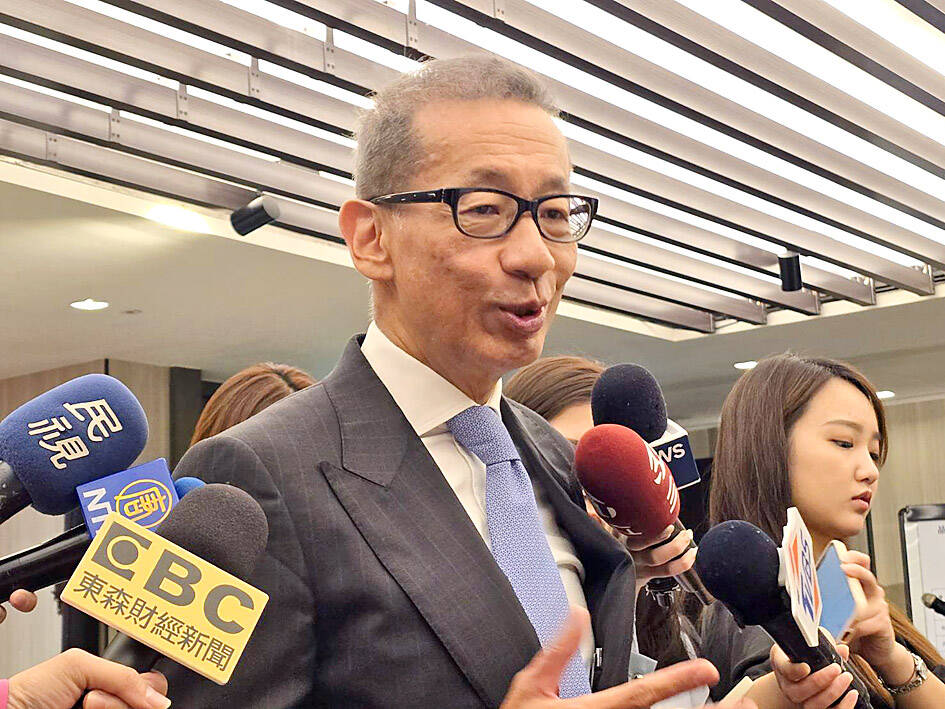Formosa International Hotels Corp (FIH, 晶華國際酒店集團) is upbeat about revenue growth next quarter, thanks to the soft opening of a new facility and the comeback of a flagship property in scenic, but quake-hit Hualien County.
The group, which operates hotels under the brands of Regent Taipei (台北晶華酒店), Silks Place (晶英酒店), Just Sleep (捷絲旅) and Wellspring by Silks (晶泉丰旅), is expected to benefit from the launch of Wellspring by Silks Beitou (北投晶泉丰旅) earlier this week and the reopening of Silks Place Taroko (太魯閣晶英酒店) next month.
The group is looking at an occupancy rate of 70 percent and daily room rates of more than NT$10,000 next year for the new facility, making it another profit driver, Regent Taipei managing director Simon Wu (吳偉正) said on Thursday.

Photo: CNA
The goal is achievable given its small capacity of 100 guestrooms and short distance from the Xinbeitou MRT Station and popular tourist attractions in the vicinity, Wu said.
Over the years, Silks Place and Wellspring by Silks have been the company’s profit drivers even during COVID-19 restrictions, he said.
The hospitality company runs 16 hotels with 2,500 guestrooms in Taiwan following the addition of Wellspring by Silks Beitiou, Wu said. It is the second Wellspring by Silks after a property in Yilan County’s Jiaosi Township (礁溪).
The new hotel sits on a build-operate-transfer plot that was leased to Fubon Life Insurance Co (富邦人壽) in 2014 for 70 years. The facility has 16 floors above ground and three basement floors, FIH head communications official Ellen Chang (張筠) said.
The hospitality company is eyeing a 40 percent revenue contribution from sales of food and beverages, and is therefore introducing two new restaurants, one featuring Japanese hotpot and the other traditional Taiwanese cuisine, Chang said.
Wellspring by Silks Beitou is targeting domestic tourists and foreign business travelers who intend to relax and take a hot spring bath as a convenient escape from their busy schedule, she said.
The practice of “staycation” has gained popularity in Taiwan, as it offers local tourists the perfect blend of convenience and escape, or a holiday experience in their own cities or within a short drive from home, without the need for long-distance travel, the company said.
This trend and a strong recovery in business meetings and trade shows helped FIH to increase its profit in the first half of this year, while other peers saw a slowdown, despite its property in Hualien’s Taroko suspending operations after a massive earthquake in April, Chang said.
FIH’s net income climbed 2.13 percent year-on-year to NT$720 million (US$22.5 million) in the first six months, or earnings per share of NT$5.65, company data showed.
The results came even though the group halted price hikes for its food and beverages in the second half of last year, as Taiwanese have complained about the pinch of inflation, FIH food and beverage manager Gary Lo (羅明威) said.
Nevertheless, food and beverage revenue expanded 7 percent in the first seven months, Lo said, adding that banquet demand is expected to gain traction next quarter, which is traditionally the high sales season.

CHIP RACE: Three years of overbroad export controls drove foreign competitors to pursue their own AI chips, and ‘cost US taxpayers billions of dollars,’ Nvidia said China has figured out the US strategy for allowing it to buy Nvidia Corp’s H200s and is rejecting the artificial intelligence (AI) chip in favor of domestically developed semiconductors, White House AI adviser David Sacks said, citing news reports. US President Donald Trump on Monday said that he would allow shipments of Nvidia’s H200 chips to China, part of an administration effort backed by Sacks to challenge Chinese tech champions such as Huawei Technologies Co (華為) by bringing US competition to their home market. On Friday, Sacks signaled that he was uncertain about whether that approach would work. “They’re rejecting our chips,” Sacks

NATIONAL SECURITY: Intel’s testing of ACM tools despite US government control ‘highlights egregious gaps in US technology protection policies,’ a former official said Chipmaker Intel Corp has tested chipmaking tools this year from a toolmaker with deep roots in China and two overseas units that were targeted by US sanctions, according to two sources with direct knowledge of the matter. Intel, which fended off calls for its CEO’s resignation from US President Donald Trump in August over his alleged ties to China, got the tools from ACM Research Inc, a Fremont, California-based producer of chipmaking equipment. Two of ACM’s units, based in Shanghai and South Korea, were among a number of firms barred last year from receiving US technology over claims they have

It is challenging to build infrastructure in much of Europe. Constrained budgets and polarized politics tend to undermine long-term projects, forcing officials to react to emergencies rather than plan for the future. Not in Austria. Today, the country is to officially open its Koralmbahn tunnel, the 5.9 billion euro (US$6.9 billion) centerpiece of a groundbreaking new railway that will eventually run from Poland’s Baltic coast to the Adriatic Sea, transforming travel within Austria and positioning the Alpine nation at the forefront of logistics in Europe. “It is Austria’s biggest socio-economic experiment in over a century,” said Eric Kirschner, an economist at Graz-based Joanneum

BUBBLE? Only a handful of companies are seeing rapid revenue growth and higher valuations, and it is not enough to call the AI trend a transformation, an analyst said Artificial intelligence (AI) is entering a more challenging phase next year as companies move beyond experimentation and begin demanding clear financial returns from a technology that has delivered big gains to only a small group of early adopters, PricewaterhouseCoopers (PwC) Taiwan said yesterday. Most organizations have been able to justify AI investments through cost recovery or modest efficiency gains, but few have achieved meaningful revenue growth or long-term competitive advantage, the consultancy said in its 2026 AI Business Predictions report. This growing performance gap is forcing executives to reconsider how AI is deployed across their organizations, it said. “Many companies